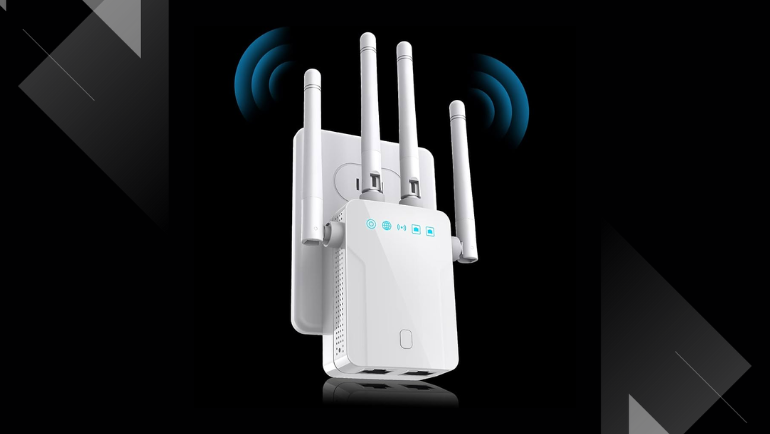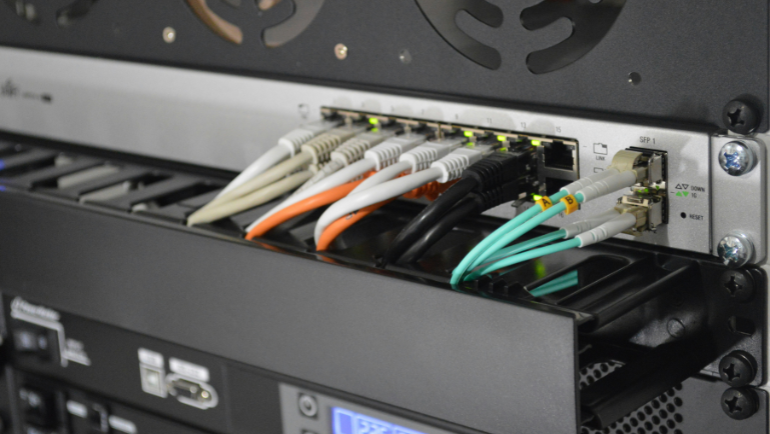
Wi-Fi repeaters are becoming essential for businesses aiming to eradicate internet connectivity issues. Most workplaces experience dead zones due to obstacles like doors and walls which can lead to a less productive environment. Although, Wi-Fi repeaters can be your next choice to wipe out dead zones and enhance the connectivity throughout the office. Here’s an overview of a Wi-Fi repeater, its types, cost, and everything you need to know.
What is a Wi-Fi Repeater?
Wi-Fi repeaters started to gain popularity in the middle of 2010 as more businesses were expanding to online modes of operation. Many networking companies like TP-Link and Linksys were the first to invest in WiFi repeater technology to solve the problem of dead zones.
A Wi-Fi repeater serves as a device to enhance network range, enabling wider coverage across your office for improved connectivity. It supports wireless connections, making it ideal for expanding network access in workplaces with complex layouts. Essentially, the WiFi repeater acts as a tool to link your router with areas that previously had no or weak Wi-Fi coverage.
Types of Wi-Fi Repeaters
Following are the types of Wi-Fi Repeaters that you can buy for your enterprise. Let’s explore which one is a better choice for you.
Traditional Wi-Fi Repeater
These are the most common types of WI-Fi repeaters that you’ll see in most offices and enterprises. It connects wirelessly with your main connection hub and retransmit the signal for better coverage. However, you’ll experience a slight dip in the bandwidth as your data request will first go to the repeater and then the main internet hub.
Powerline Wi-Fi Repeater
Powerline WiFi repeaters expand your router’s signal by using electrical wiring of the workplace. The package includes two adapters: one plug into an outlet near your wireless router, and the second where you need stronger Wi-Fi. The adapters transfer the signal from the router via electrical wiring toward the dead zone. Although you might experience a slower internet but it can be a smart choice to expand your signal to a distant section within your workplace.
How Does a WiFi Repeater Work?
A Wi-Fi repeater connects to the primary main router and boosts it to a wider area. It is the best way to have reliable and functional internet access in every part of your business even in spots with inconsistent Wi-Fi. Therefore, buy a Wi-Fi repeater or convert your existing router into an extender or repeater to boost your wireless internet connection. a
How to Configure and Secure a Wi-Fi Repeater
Setting up a WiFi repeater is simple and easy to configure. Explore how you can set up your Wi-Fi repeater and make it secure from hackers and data breaches.
Configuration
- Opt for the optimal Location (spot halfway between your router and the area with dead zone.)
- Power on the WiFi signal repeater
- Open the web browser and enter the IP address that you can find on the back of the device.
- Change the Network Name/Service Set Identifier (SSID) and password and make sure you keep the same SSID and password as your main router for uninterrupted connectivity.
- Test the connection on multiple devices and places to ensure internet connectivity around the workplace.
Security
- Change Default Administrator Credentials
- Do not keep the default SSID as it shows the model of your repeater
- Update Firmware regularly
- Use strong encryption like WPA2 or WPA3
- Use strong passwords with a mix of characters, numbers, and alphabets
- Create a Guest Network for outsiders
Wi-Fi repeater Lifespan
The lifespan of a wireless repeater is influenced by its build quality and the environment. The components of your Wi-Fi router repeater may deteriorate more quickly if it is kept in an area with high temperatures and humidity. Nonetheless, you may prolong the life of your wired Wi-Fi repeater by placing it in a temperature-controlled space. Moreover, to ensure the greatest build quality and longest lifespan, buy a product from one of the top IT hardware brands.
WiFi repeater Price Range
The price of a Wi-Fi repeater can range from $55 to $2900. The base model is reasonably priced and suitable for basic tasks. On the contrary, if you are opting for a more expensive model then you’ll get a better performance. Computing Worlds has a wide range of Wi-Fi repeaters from Linksys and TP-Link that enterprises can buy.
You can also request a bulk quote online for the required wi-fi Routers.
Pros and Cons of Wi-Fi Repeater
Wi-Fi Repeater is a convenient tool for enterprises but it has its disadvantages as well.
| Pros | Cons |
| Extended coverage to cover dead zones. | Speed may decrease due to rebroadcasting. |
| Less expensive and simple | Susceptible to interference from other devices |
| Plug-and-play setup | Managing multiple repeaters can be complex in big setups. |
| Easily relocated to optimize coverage | Must be strategically placed to balance the reception and coverage |
Reasons You Need A Wi-Fi Repeater
Businesses and companies can improve their internet coverage by using a Wi-Fi repeater. These are the reasons that your business needs a Wi-Fi repeater.
Irregular Layout at Workplaces
If your space has irregular layouts and obstacles like doors and glass windows then there is a high chance of consistent dead zones. It can degrade the overall productivity which will affect your business revenue. However, to tackle all these problems repeaters come up as a solution to eliminate dead zones. Wifi repeater uses the internet signal and retransmits it to enhance connectivity. That’s how installing W-Fi repeaters in dead zones ensures your workplace has internet connectivity at every corner.
Enhance Connection Quality for Multiple Devices
The increasing number of devices in workplaces can strain a single router, leading to suboptimal performance and challenging scalability. That’s why enterprises buy repeaters from TP-Link or net-gear to aid more devices like servers, PCs, smartphones, and Internet of Things (IoT) gadgets.
Essential Features to Look for When Buying a Wi-Fi Repeater
Following are the numerous capabilities of a Wireless Wi-Fi repeater that you must consider to get real value for your money.
- Support for Dual Band: 2.4 and 5 GHz
- Support for MU-MIMO: With a MU-MIMO Wi-Fi repeater, you can control up to four devices at once and maintain a steady wireless connection
- Beamforming Support: This function stops the signal from spreading outward in all directions and lets it focus on a specific region
- Smart Roaming: The Smart Roaming feature enables wireless client devices to automatically connect to the strongest Wi-Fi signal
Future Trends
Top IT brands are constantly evolving the technology behind wireless networking devices like Wi-Fi repeaters and extenders. Therefore, we can expect to see AI integration with better speed and secure management for optimal performance. Furthermore, the rollout of newer Wi-Fi standards like Wi-Fi 6 (802.11ax) and the upcoming Wi-Fi 7 is expected for higher Wi-Fi repeater speeds and greater bandwidth. Enterprises are inclining more towards IoT devices and networking devices wireless internet repeaters play a critical role in ensuring that Internet of Things (IoT) devices have reliable connectivity.
Frequently Asked Questions
How far can a Wi-Fi repeater reach?
Wi-Fi repeater can reach anywhere between 1,000 Sq Ft to 2,500 Sq Ft, depending on the model.
Does using a repeater slow down the internet?
Repeaters can lower your bandwidth because they broadcast and receive data over the same radio or frequency.
Is Wi-Fi mesh better than a repeater?
Yes, Mesh Wi-Fi systems are better for removing dead zones across a big area since it excel at offering constant service throughout larger workspaces.
Overall, a Wi-Fi repeater is an affordable and convenient option for small and medium-sized businesses (SMBs) to get faster internet coverage. However, big tech giants and organizations should prefer to install a Mesh Wi-Fi system for seamless connectivity and scalability.
Stay connected with the Computing Worlds blog to get updates about the networking world.






